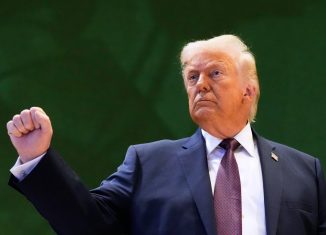
Acting DHS Secretary Kevin McAleenan spoke with Brian Kilmeade about congress leaving town without acting on the crisis at the southern border. McAleenan discussed Mexico helping the U.S. expand migrant protection protocols, giving a tour of the border to Senate Minority Leader Chuck Schumer, the 16 U.S. Marines arrested on suspicion of human trafficking. Brian also asked McAleenan about Congresswoman Alexandria Ocasio-Cortez’s claims that migrants are drinking from toilets and that she was made to feel uncomfortable by the U.S border patrol. Plus, McAleenan on DHS working to make sure the next presidential election is on track to be secure from foreign interference.
Watch here:
BRIAN KILMEADE, FOX HOST: The number one issue facing this country, if you look at the polls for Democrats and Republicans, is the situation with immigration at our border. And that is just one of the many jobs on Kevin McAleenan’s plate. He is acting United States Secretary of Homeland Security, and he joins us right now. Kevin, thanks so much for joining us.
KEVIN MCALEENAN, ACTING U.S. SECRETARY OF HOMELAND SECURITY: Thanks, Brian. Good to be with you.
KILMEADE: I tell you, I thought about you as soon as I heard that there’ll be no holding over of Congress. They’re going to start their six-week vacation despite the crisis at our border where, oh, just about 100,000 are coming through illegally every month. What do you say to that, Kevin? How do you process that?
MCALEENAN: It’s really unfortunate, Brian. They’ve had clear solutions on the table from this administration from the beginning of the year.
We’ve worked on careful language to address the three main drivers of this crisis submitted to Congress on May 1st. They’ve had plenty of time to work on it. We’ve testified about it. And — and leaving town without acting on it is really unfortunate.
KILMEADE: All right, here is what — what went down yesterday, Ranking Member Doug Collins, Jerry Nadler — Chairman. Let’s listen. Cut 21.
(BEGIN AUDIO CLIP)
REP. JERRY NADLER (D-NY): Instead of addressing the root causes of migration and competently managing the challenges at our border, the Trump administration has chosen to dehumanize immigrants and exploit this crisis for political gain.
REP. DOUG COLLINS (R-GA): You know what is dehumanizing? It’s continuing to bring the same witnesses or the same people from the same agencies to talk about this over and over and over again.
My Democratic colleagues have ideas. I may disagree with those ideas, but put a bill up. That’s what Congress is supposed to do.
(END AUDIO CLIP)
KILMEADE: So, are you politicizing and dehumanizing immigrants?
MCALEENAN: Absolutely not, Brian. I mean, you want to talk about competent management, when we finally got the supplemental emergency funding that we asked for on May 1st — 57 days later, within five weeks we reduced the number in custody from 20,000 to 7,500.
That’s a huge improvement based on exactly what we asked for from Congress. As well as the president’s deal with Mexico, that’s the other big factor that’s changing the dynamic at the border right now.
KILMEADE: But — but where did those people go?
MCALEENAN: So that’s the — that’s the key thing. We were able to remove people back to Central America through ICE for the single adults. For the unaccompanied children, they’ve gone to HHS, so — better facilities away from the border.
Just like we explained to Congress, the bulk of that emergency supplemental was for unaccompanied children to have a better situation. And now we’ve expanded the Migrant Protection Protocols, thanks to Mexico’s agreement. And most people now, today, crossing the border are not being released. They’re waiting for a hearing in Mexico.
KILMEADE: So I do want to talk about what’s happening in San Diego and those Marines that were accused of human trafficking. But I do want to get more on this. So we have six weeks with nothing. We do know that Senator Schumer went down to the border over the weekend. What did he see?
MCALEENAN: We showed him everything. We want to be very transparent about what we’re facing and the specific causes of the challenges. They saw all the same facilities that have been talked about publicly, written about by the DHS inspector general.
And they saw an organized process with Border Patrol agents doing their best to care for people in custody that they’ve apprehended crossing our border legally. The kind of questions we’re asking is how we can improve specific aspects of that care. But what we’d like to be talking about is how do we address the fundamental drivers of the crisis and get the loopholes closed that are incentivizing people to make the journey.
KILMEADE: Have you talked to the — I’m talking to Kevin McAleenan, he’s acting director of Homeland Security. You’ve been to Central America many times. You’re trying to deal with this leadership.
Two things happened that’s out of your control. Guatemala’s judiciary voted against third country status and the ninth district court has voted to — has decided to disallow third-party status. So if somebody’s in another country and wants to apply for our — to get into our country, they now can, correct?
MCALEENAN: So absolutely. I mean, we’ve — we’ve struggled with court action, you know, interdicting our authorities to improve the situation at the border for months. And you’ve been covering that. But I’ve long believed that the best way to address this regional flow is to have partners step up and take action, and that’s what the president expects.
For Guatemala’s court to — to make that ruling at the 11th hour when we’re signing a historic agreement, it was very unfortunate but we’re pushing through that because the best way to manage this is for people that truly need protections from asylum to be able to seek those protections as close to their home country as possible.
And that’s what Guatemala’s government, their executive branch, has stepped up and said they’re willing to do. We need to get that over the line.
KILMEADE: Well, here is the other — here is Henry Cuellar, a Democratic Congressman who represents a border country — cut 22 — from Texas.
(BEGIN AUDIO CLIP)
REP. HENRY CUELLAR (D), T.X.: My thing is — just generally is, you know, we cannot demonize any of our law enforcement officials down there. You know, they’re trying to do their job. But again, I’m one of those that if somebody is a bad apple, we definitely have to go over that.
I live at the border. I don’t go visit; I live at the border. I’ve talked to a lot of these men and women. And again, you know, generally speaking they’re good people trying to do their job. But if the policy’s wrong, we need to change a policy.
UNIDENTIFIED FEMALE: Yes.
CUELLAR: If there’s a bad apple, we go after that.
(END AUDIO CLIP)
KILMEADE: So I had Senator Sinema. We talked to Senator Doug Jones. These are Democrats who are teaming with Ron Johnson. Kevin, you work the halls of Washington as well as work Central and South America. Are you making progress?
MCALEENAN: I think so. I mean, you just mentioned three members that are engaging very productively on — two border members, and Senator Sinema and — and Henry Cuellar is a tremendous supporter on our Appropriations Committee, the resources we need.
He’s absolutely right. He lived in Laredo, he knows this community. He lives in — he’s neighbors with Border Patrol agents, he knows what they do to protect our border and secure those communities. And we’ve got to have that balanced approach. Sure, if we have someone who does something wrong, we’re going to hold them accountable.
But by in large, these are tremendous people that got into a career to protect others and they’re doing a great job. And he — he highlighted the need for policy solutions. So yes, we are — we’re making some progress. I think people are listening. We’re — we’ve gotten the clear message across that this is a crisis.
We’ve been clear about what’s causing it, that — that family units are — believe that they’ll be released in to the U.S. if they come now. And what Congress needs to do is — is address those three loopholes in the law that are causing it.
KILMEADE: Do you know of these agents evidently that were harassing and making Alexandria Ocasio-Cortez, the Congresswoman from New York, uncomfortable?
MCALEENAN: So (ph) — no, I don’t know the individuals, but that — that investigation is proceeding. We’ve put people on administrative duties who were involved in some of those posts, as — and they’re going to be held accountable —
(CROSSTALK)
KILMEADE: No, no. I’m not talking about the post. No, I’m not talking about the post. I’m talking about when she was inside. She said that some of the border agents made her feel uncomfortable. Do you know anything about that?
MCALEENAN: — Yes, I — I’ve talked to people who were in that tour and with the group and there was no unprofessional action by CBP.
KILMEADE: So she made that up?
MCALEENAN: I — I don’t know how she felt. I can’t — I can’t characterize that, Brian. But I can tell you that we gave a fair and transparent tour to that group and, obviously, they’ve characterized it the way they see it too (ph).
KILMEADE: Has anyone every told you they’re drinking out of the toilet?
MCALEENAN: No one is drinking out of toilets. No one has been told to drink out of toilets. There’s water available. There was water available right outside the holding area that — that the Congresswoman claimed that this happened.
KILMEADE: So what does that — so, is she not telling the truth?
MCALEENAN: I’m not going to characterize what she understood from talking with the migrant. But I can tell you that there was water available on the other side of an open door and other migrants in that same area confirmed that.
KILMEADE: Sixteen U.S. Marines were arrested of suspicion of human trafficking across the border. This happened at Camp Pendleton, another area of California, stemmed from separate investigation. Two other Marines were arrested over this month on human trafficking charges too. What could you tell us about that, as director of Homeland Security?
MCALEENAN: Yes, that’s unfortunate, obviously, on lots of levels. I would commend the Naval Criminal Investigative Service for indentifying this concern and — and following up aggressively. It’s something that we’ll be partnering with them on with — with Homeland Security investigations. But these Marines were not involved in our Southern Border support operation. And they’ve — they made some poor choices that didn’t represent the U.S. Marine Corps well.
KILMEADE: Kevin, what — are you taking off six weeks like Congress?
MCALEENAN: Absolutely not. I’m headed to the border next week. We remain fully engaged in addressing this crisis. I had the ministers from Central America in on Wednesday from five countries talking about how we’re going to stop the flow from Panama to Mexico. So, we’re — we’re fighting the fight.
KILMEADE: I got Doug Collins just around the bend, ranking member. He understands the crisis. You heard what he had to say. But I do want to widen this a little bit for you, because your job is more than the border. It used to be the border, but now it’s more than that.
And many people watched the Mueller probe and saw the beginning. And saw how we talked about, with the Russians tried to now infiltrate into all 50 states into our election process. And Iran is looking to do the same thing. As director of Homeland Security, what’s your role? What are you guys doing?
MCALEENAN: Yes. So, our Cybersecurity and Infrastructure Security Agency, CISA, that’s a federal agency responsible for supporting states and local jurisdictions that manage the elections. So we give them comprehensive cyber consulting support. We do penetration testing. What we’re trying to do is make sure everybody has the highest possible standard, the 8,800 jurisdictions around the country that manage elections, as we go in to 2020.
KILMEADE: So for people who say you haven’t done anything since, are they right?
MCALEENAN: They’re not right, no. We’re engaged with all 50 states. Just a few weeks ago we had a major tabletop with all of the state election officials, a number of — of key counties —
KILMEADE: Right.
MCALEENAN: — engaged, testing different scenarios. And we feel like we’re on track for very secure elections.
KILMEADE: And Kevin, I just want to let you go with this final question, what are you doing now? The courts had a setback. Guatemala gave you a setback. What are you doing?
MCALEENAN: Well, we’re not slowing down. We’ve implemented and expanded MPP. We’ve obviously applied the supplemental funding to provide a better situation from a humanitarian perspective at the border. We’ve got Border Patrol agents that are out on the line again, that don’t have to do the processing at the huge numbers in custody that we had before.
So, the situation broadly is improving, thanks to the president’s engagement with Mexico, the supplemental funding. But we’re going to keep looking for legal authorities and international partner options to stem this flow.
KILMEADE: All right. I appreciate your work. I admire the fact that you’re getting blistered for — and because you’re just being used as somebody to make political points. And I admire you for keeping your cool.
It is totally not — it is totally inaccurate to describe you as anything but compassionate, caring, working 22 hours a day. I appreciate what you’re doing, Kevin McAleenan, thanks so much.
MCALEENAN: Thanks, Brian. And it’s for the men and women on the line who do the real hard work. I appreciate it.
KILMEADE: Right, absolutely. Keep it going, while Congress goes on sabbatical.







